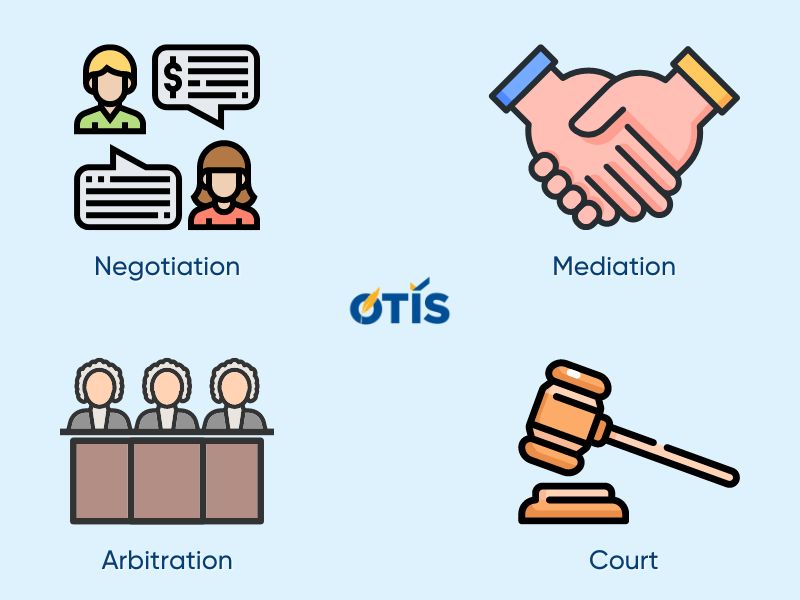In the process of conducting commercial activities, the occurrence of conflicts and commercial disputes is inevitable. So, according to Vietnamese law, what methods of commercial dispute resolution can the parties choose? In order to provide an overview of the issue, OTIS LAWYERS would like to send you the article below!
Legal grounds
Civil Procedure Code 2015
Law on Commercial 2005
Law on Commercial Arbitration 2010
Decree No. 22/2017/ND-CP on Commercial Mediation
The concept of commercial disputes
Due to the frequent feature and serious consequences of commercial disputes to the market economy, Vietnamese law has paid attention and released legal regulations to regulate this issue for along time.
The history of formation and development of Vietnamese law shows that the concept of trade is increasingly expanded and consistent with the concept in commercial agreements. According to Article 3 of the Law on Commercial: “Commercial activities are activities for profit-making purposes, including purchase and sale of goods, provision of services, investment, trade promotion and activities aimed at other profitable purposes”.
Thus, we can understand commercial disputes as conflicts (disagreements or conflicts) between cooperative parties about rights and obligations in the process of performing commercial activities.
Methods of settling commercial disputes in accordance with Vietnamese law
According to the provisions of Article 317 of the Law on Commercial 2005, there are 04 forms of dispute settlement in Vietnamese commerce, including: negotiation; mediation; courts and commercial arbitration.
Each method has its advantages and disadvantages as well as its own legal compliance, content, procedures and process Therefore, Vietnamese law allows the parties to freely choose the appropriate method, depending on their own conditions as well as the appropriate level of the method to the content of the dispute as well as the friendly relationship between the parties.
Negotiation
Negotiation is the earliest known, most common and easiest method of commercial dispute resolution. Negotiation is understood as a method of dispute settlement through which the parties voluntarily discuss, reach an agreement, self-arrange, and remove arising disagreements to eliminate disputes without assistance or judgment of any third party.
It is popular and recommended to use not only because the procedure is simple and easy to implement, but this method also helps the parties in the dispute to save maximum time and costs. In addition, the negotiation process is not bound by complicated and complicated legal procedures. Moreover, the things that entrepreneurs are particularly interested in such as honor, prestige, business secrecy, tension in cooperation relationships are kept confidential and protected almost completely.
Although this method is considered to be the method that maximizes the freedom of agreement and freedom of disposition of the parties. But at the same time it also brings a major drawback that the implementation of the negotiation results completely depends on the voluntariness of each party without any legal mechanism to ensure it.
Mediation
Mediation is a method of dispute resolution with the participation of a third party as a mediator to assist and persuade the parties to find solutions to eliminate the arising dispute. The third party shall be selected by the parties. Specifically, Clause 1, Article 3 of Decree 22/2017/ND-CP stipulates: “Commercial mediation is a method of settling commercial disputes agreed upon by the parties and acted as a commercial mediator to support dispute settlement under the provisions of Decree 22/2017/ND-CP.”
Although the subject of final decision is still the disputing parties, it is undeniable that the important and central role of a third party is chosen as a mediator. Therefore, mediators need to meet conditions such as professional qualifications, knowledge, legal knowledge, practical experience and ensure to maintain a neutral stance between the parties…
Same as negotiation, the mediation process and procedures between the parties will not be governed by mandatory provisions of the law. The law only recognizes negotiation and conciliation as the preferred dispute resolution methods.
The implementation of successful conciliation results also completely depends on the voluntariness of the parties without any legal mechanism to ensure the fulfillment of the commitments of the parties during the mediation process.

The Principle of mediation
Pursuant to Article 4 of Decree 22/2017/ND-CP stipulating that conciliation must be based on the following principles:
– Disputing parties participating in mediation are completely voluntary and equal in terms of rights and obligations.
– Information related to the mediation case must be kept confidential, unless the parties agree in writing or otherwise provided for by law.
The content of the mediation agreement does not violate the prohibition of the law, is not contrary to social ethics, is not intended to evade obligations, and does not infringe upon the rights of a third party.
Conditions for settling disputes by commercial mediation
According to the provisions of Article 6 of Decree 22/2017/ND-CP, disputes can be resolved by commercial mediation if the parties have an agreement on conciliation. The parties may agree to settle the dispute by mediation before, after the dispute or at any time during the dispute settlement process.
Settlement of disputes by commercial arbitration
Arbitration is a method of commercial dispute resolution through the action of an Arbitrator as an independent third party to end conflicts by making an arbitral judgment. This is a non-governmental method and is conducted only when there is an agreement of the parties and the dispute must fall under the jurisdiction of the Arbitrator. Specifically, according to Clause 1, Article 3 of the Law on Commercial Arbitration 2010, commercial arbitration is a method of dispute settlement agreed by the parties and conducted in accordance with theLaw on Commercial Arbitration 2010.
This method is “favored” by entrepreneurs because of its outstanding advantages. Not only is the method to ensure the highest freedom and self-determination of the disputing parties. They can freely agree to choose the Arbitration Center, Arbitrator, location, time or even the system of rules for conducting arbitration… But it is also a method to ensure maximum confidentiality and privacy for enterprises – issues that can greatly affect the reputation and brand of the enterprise if it is disclosed.
Unlike court judgments and decisions, arbitral judgment are final, they cannot be appealed or protested against
Dispute settlement principles
Pursuant to Article 4 of the Law on Commercial Arbitration 2010:
Principles of dispute settlement by arbitration include:
– The arbitrator must respect the agreement of the parties if such agreement does not violate the prohibition and is against social ethics.
– Arbitrators must be independent, objective, impartial and comply with the provisions of law.
– The disputing parties are equal in terms of rights and obligations. The arbitral tribunal is responsible for creating conditions for them to perform their rights and obligations.
– Dispute settlement by arbitration shall be conducted in public, unless otherwise agreed by the parties.
– The arbitral judgment is final.
Dispute settlement conditions
Pursuant to Article 5 of the Law on Commercial Arbitration 2010, the conditions for dispute settlement by arbitration as follows:
– Disputes shall be resolved by arbitration if the parties have an arbitration agreement.
The arbitration agreement may be made before or after a dispute occurs.
– In case a party to the arbitration agreement being an individual dies or loses behavioral capacity, the arbitration agreement will still be valid for the heir or legal representative, except for cases otherwise agreed by the parties.
– In case one party to the arbitration agreement being an organization has to terminate its operation, go bankrupt, dissolve, consolidate, merge, divide, split or transform the form of organization, the arbitration agreement is still valid for the organization receiving the rights and obligations unless otherwise agreed by the parties.
Dispute settlement by court
Dispute settlement by court is a method of settling commercial disputes at adjudication agencies in the name of state power, which is carried out by the courts according to a strict order and procedures. The effective judgments of the courts are guaranteed to be enforced by the coercive power of the State.
Courts will only resolve commercial disputes when requested by the disputing parties within the jurisdiction of the court. The determination of the jurisdiction of the Court in the settlement of business and commercial disputes of countries around the world is not the same. According to Vietnamese law, the Court has the authority to hear criminal, civil, marriage and family, business, commercial, labor, administrative and other matters as prescribed under the law. And the court will resolve commercial disputes at the request of the parties.
Court decisions can be appealed or protested according to regulations
Commercial disputes falling under the jurisdiction of the Court
Pursuant to Article 30 of the 2015 Civil Procedure Code, which stipulates that business and commercial disputes under the jurisdiction of the Court.
– Disputes arising in business and commercial activities between individuals, organizations with business registration and with profit purposes.
– Disputes over intellectual property rights, technology transfer between individuals, organizations and all for profit purposes.
– Disputes between people who are not members of the company but have transactions on the contributed capital with the company or members of the company.
– Disputes between the company and its members; Disputes between the company and the manager in a limited liability company or a member of the Board of Directors, director or general director in a joint-stock company, between members of the company related to the establishment, operation, dissolution, merger, consolidation, division, separation, handover of assets of the company, transformation of the organizational form of the company.
– Other business and commercial disputes, except for cases under the jurisdiction of other agencies or organizations as prescribed by law.
Limitations for initiating a commercial dispute
Pursuant to Article 319 of the 2005 Commercial Law stipulates: The limitations for initiating lawsuits applicable to commercial disputes is two years from the time when legitimate rights and interests are infringed upon, except for the case after being complained claim, logistics service traders do not receive notice of being sued at Arbitration or Court within nine months from the date of delivery.
OTIS LAWYERS. COMMERCIAL DISPUTE SETTLEMENT SERVICE

OTIS LAWYERS are proud to be a unit specializing in consulting and resolving all kinds of disputes in business and commerce with high efficiency and reasonable costs. With the PACKAGE of commercial dispute settlement service, clients will be fully assisted by a team of professional lawyers to perform the following tasks:
– Consulting on legal regulations on rights and obligations of parties in commercial business relations;
– Prepare to contact and negotiate with relevant parties in the settlement of commercial disputes;
– Consulting on the advantages and disadvantages of each type of dispute resolution method, so that clients can choose the suitable form
– Exchange and guide s to collect documents and evidence, provide information for dispute settlement
– For the method of negotiation and conciliation: The lawyer will organize the negotiation and conciliation of the parties in the commercial dispute relationship, and at the same time conduct negotiation and conciliation on behalf of the client with the other party.
– For Arbitration and Court method: An authorized representative lawyer meets, exchanges and works with Arbitration agencies and Courts to best protect the interests of clients.
We hope that the above information will help you to solve problems and difficulties of yours. If you want to receive quick and timely legal support in the field of commercial dispute resolution and need to schedule an appointment with a commercial dispute resolution lawyer of OTIS LAWYERS, please hurry to contact us immediately at:
For any questions or comments, please contact:
OTIS AND PARTNERS LAW FIRM
Office address: K28 – Group K, Lane 68 Trung Kinh, Yen Hoa Ward, Cau Giay District, Hanoi
Email: info@otislawyers.vn
Hotline: 0987748111


 Tiếng Việt
Tiếng Việt 한국어
한국어 中文 (中国)
中文 (中国)